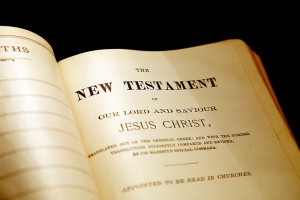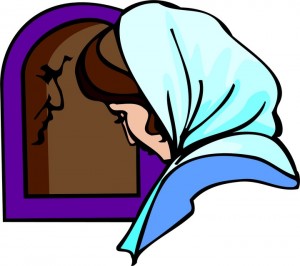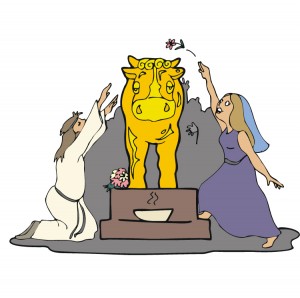Isaiah 8:14–16, In the following several verses we see an amazing prophecy concerning the two houses of Israel who, generically speaking, have become the modern church and the rabbinic Jews.
Here Isaiah prophesies about the canonization of the Bible into two subdivision—the Torah (or loosely speaking, the Old Testament) and the Testimony (the New Testament). He also predicts that each of these two religious groups (the Jew and he Christians) would spiritually stumble over or have a problem with the identity of the Messiah, who is the Stone of Stumbling and the Rock of Offense. In general, as we shall see, the Christians struggle with the pro-Torah message of the Old Testament (or Word of Elohim), and the Jews reject the message of the New Testament (or Testimony of Yeshua) about the Messiahship of Yeshua.
Isaiah 8:14, Stone of stumbling. Both houses of Israel (Ephraim and Judah; i.e., the Christian [see notes at Gen 48:14,16] 48: and the Jews) have stumbled over the stone of stumbling, who later on is identified as Yeshua, the Messiah (1 Pet 2:4–8; Rom 9:32–33; 1 Cor 1:23). The non-believing Jews stumbling over the Messiahship of Yeshua who is the Living Torah-Word of Elohim incarnate (John 1:1,14), while the Christians stumble over the Written Torah, which they claim was abolished and is minimally relevant to them.


This stone of stumbling is an obvious reference to Yeshua who is a stone of stumbling to both houses of Israel (i.e., the non-believing Jews and the Christians.) The Christians stumble over or reject (at least, in part) Yeshua who is the Written Torah-Word of Elohim (John 1:1). The non-believing Jews, on the other hand, reject Yeshua, the Living Torah-Word of Elohim who came in flesh form (John 1:14).
Isaiah 8:16, 20 Bind up the testimony…my disciples. Heb. testimony means “confirmation, attestation.” This appears to be a prophecy concerning Yeshua’s disciples, whom he commissioned to “seal the Torah” (loosely speaking, the Old Testament or OT) and add to it the Testimony about him (the New Testament or NT).
Here Isaiah is prophesying the canonization of the NT by the disciples of Yeshua (who are mentioned in verse 13). Did you know that the NT’s name for the NT isn’t the NT, but the Testimony of Yeshua—a name that John who finalized the NT canon gave it when he was writing the Book of Revelation? There, he calls the OT or Tanakh the “Word of Elohim” and the NT “the Testimony of Yeshua” (see Rev 1:2, 9; 6:9; 12:17; 14:12; 20:4).

What do the words bind and seal signify? The Hebrew for the word bind means “to close.” The word seal means practically the same: “to cap off, to enclose.” This is exactly what the apostles did with the message which Yeshua the Stone and Rock of Isaiah 8:14 gave them. They were to complete it. Bind it up. Close it shut. The authority to perform such an important job may have been reflected in Messiah’s teaching that the apostles had power to ‘bind on earth’ (Matthew 16:19). The word to bind has the significance of authorization or giving judgment, just as the word unbind means “not to receive or not accept. …” In a word, the apostles felt that they had authority, even from the Old Testament, to bind, seal, authorize and canonize the Law and Testimony of Messiah. This meant to put the teachings of Messiah in a book, just like the Old Testament was given to the early Jews (Restoring the Original Bible, by Ernest Martin, pp. 298–299). (For more on this subject, see notes at John 16:12–15; Rom 16:25–26 and Mark 3:16–17.)








